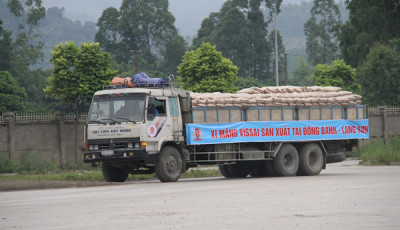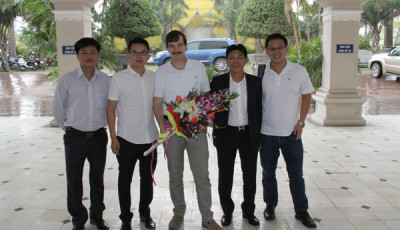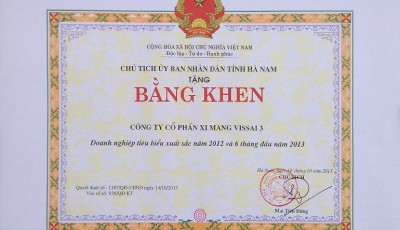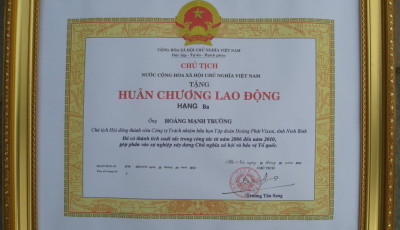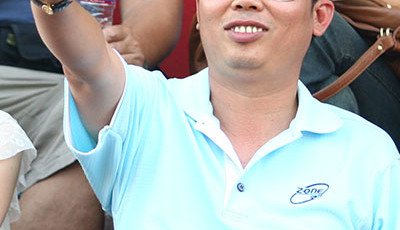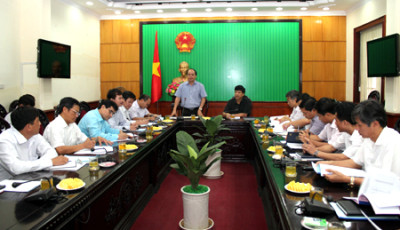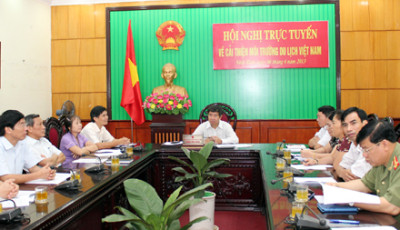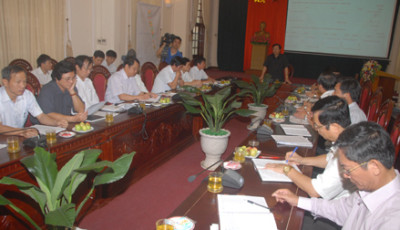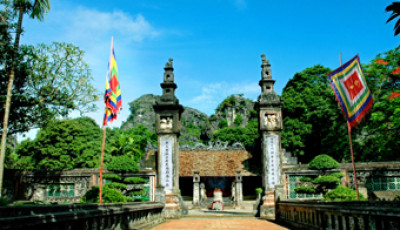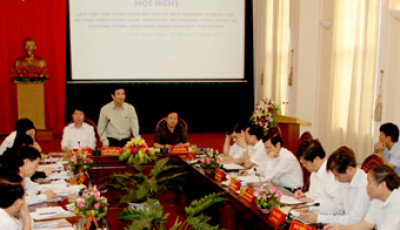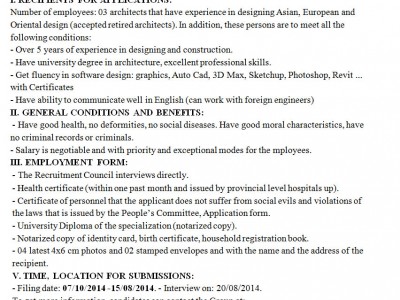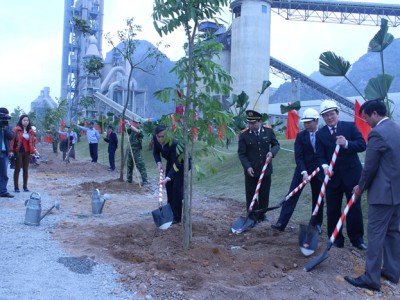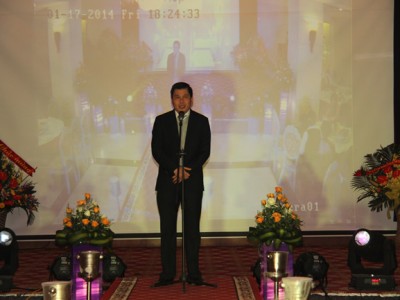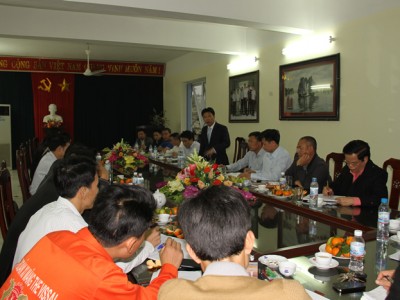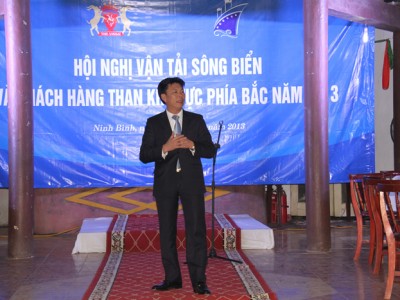Japan to provide $1 billion in ODA for Vietnam
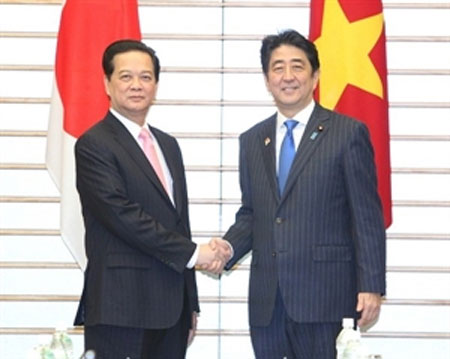 |
| Japanese Prime Minister Shinzo receives PM Nguyen Tan Dung. (Source: VNA) |
The amount will be allocated to five projects in Vietnam during the second half of the 2013 fiscal year.
The projects include two sections of the North-South Highway, two infrastructure development projects at Lach Huyen Port in Hai Phong City, and a programme to support Vietnam in responding to climate change and enhance its competitiveness.
The Japanese side also promised to consider Vietnam’s proposal to build a Vietnam-Japan friendship hospital and expand the programme of training Vietnamese nurses in Japan . During the talks, PM Shinzo Abe affirmed that Japan sees Vietnam as an important partner.
The two sides agreed on directions and a number of specific measures to further deepen the Vietnam-Japan strategic partnership.
They expressed their delight at new progress in bilateral cooperation in all fields, while holding that practical activities in celebrating the Vietnam-Japan Friendship Year and the 40 th anniversary of diplomatic ties have made significant contributions to the consolidation of friendship and mutual understanding between the two peoples.
PM Dung said Vietnam always treasures cooperation with Japan and wishes to boost the strategic partnership with the country in a more comprehensive way.
The two leaders agreed on the significance of the maintenance of high-level meetings as well as the effective implementation of cooperation mechanisms, while lauding the setting up of the security dialogue mechanism.
The two sides pledged to continue their close coordination in the implementation of important economic cooperation projects such as the North-South Highway , the construction of the Ninh Thuan No. 2 nuclear power plant and the Vietnam Space Centre.
They committed to considering the possibility of signing a plan of action to realise agricultural cooperation between the two countries, including the establishment of a joint working group in the field.
The Vietnamese leader affirmed that Vietnam will create all possible conditions for Japanese firms to invest in Vietnam by effectively conducting the Vietnam-Japan Joint Initiative in improving investment environment in Vietnam.
He suggested that Japan pay more attention to the implementation of the underway Bach Dang bridge construction project.
Meanwhile, PM Shinzo Abe pledged to back Vietnam in carrying out of action plans in six prioritised sectors included in the Vietnam’s industrialisation strategy and the Vietnam-Japan cooperation framework by 2020 with a view to 2030.
Japan will also consider Vietnam’s suggestion to create favourable condition for Vietnamese agricultural products to enter the Japanese market.
Both host and guest agreed that cooperation in human resources development is among key issues of the bilateral relationship, welcomed the initiative to establish the Vietnam-Japan University in Hanoi and consented to jointly facilitate the project’s early implementation.
PM Dung proposed both sides conduct research on the possibility to set up a long-term cooperation programme in education and training.
The two leaders also discussed international and regional issues of common concern.
They agreed on the importance of ensuring peace, stability and development in the region, including peace, security, safety and freedom of navigation and aviation based on international law.
They affirmed to continue closely working at international forums, organisations, contributing to peace, stability, cooperation and prosperity in the region.
After the talks, PMs Dung and Abe witnessed the signing of a diplomatic note of exchange for three projects in the 2013 fiscal year worth 54 billion JPY, namely the international terminal T2 of Noi Bai International Airport, the Da Nhim hydro-power plant and Hanoi’s belt road 3’s Mai Dich-Nam Thang Long section flyover .
At the joint press briefing, PM Dung thanked Japan for its ODA for Vietnam and said that the two sides proposed some new cooperation contents, including the Vietnam-Japan Friendship hospital project.
PM Abe congratulated the success of the Vietnam-Japan Friendship Year, affirming his country places importance to cooperating with Vietnam, especially in economics, trade, investment and human resources training.
Japan is willing to assist Vietnam in infrastructure development and human resources training, he said.
The same day, the Vietnamese leader concluded his four-day visit to Japan.
Vietnam, Japan eager to promote stronger strategic partnership
Prime Minster Nguyen Tan Dung and his Japanese counterpart Shinzo Abe have reached high consensus on orientations and specific measures to deepen the Vietnam-Japan strategic partnership.
At their talks on December 15, both leaders expressed their delight at the new steps of bilateral development across various fields, saying that diverse activities during the Vietnam-Japan Friendship Year to mark the 40th anniversary of the two countries’ diplomatic ties have contributed to strengthening the friendship and mutual understanding.
PM Abe said Japan considers Vietnam an important partner and described PM Dung’s Japanese trip as an event of great significance to bilateral ties.
PM Dung affirmed Vietnam’s recognition of importance to and its desire to comprehensively develop the strategic partnership with Japan.
The two heads of government agreed to maintain high-level exchange visits, effectively implement cooperation mechanisms and closely coordinate on cooperation projects.
They welcomed the establishment of a security dialogue mechanism and proposed action plans to realise agricultural cooperation including the setting up of a joint working group in this field.
PM Dung voiced his country’s willingness to facilitate Japanese investment by effectively implementing the Vietnam-Japan Joint Initiative and improving the investment environment in Vietnam.
He asked the Japanese side to support the implementation of the Bac Dang bridge construction project.
PM Abe pledged to help Vietnam conduct its action plans for the six key industries in the industrialization development strategy within the Vietnam-Japan cooperation framework until 2020 with a vision for 2030.
Japan will scrutinize Vietnam’s proposals to help its farm produce penetrate the Japanese market, implement Vietnam-Japan hospital project and increase the reception of Vietnamese medical practitioners and orderlies.
Abe announced an official development assistance (ODA) funding worth US$1 billion for five Vietnamese projects in the second phase of the 2013 fiscal year and a climate change adaptation programme.
The two sides applauded the proposed establishment of a Vietnam-Japan University in Hanoi and consented to implement the project as soon as possible.
PM Dung also suggested studying the possibility of building a long-term education and training cooperation programme.
The two leaders compared notes on international and regional issues of mutual concern, and emphasized the importance of ensuring regional peace, stability and development including maintaining peace, security and maritime safety and freedom in line with international law.
They concurred to increase coordination at international forums and in international organizations to make positive contributions for the sake of peace, cooperation and prosperity in the region.
After the talks, the two PMs witnessed the signing of diplomatic notes for three projects valued at JPY54 billion in the first phase of the 2013 fiscal year, including building international terminal T2 of Noi Bai International Airport, expanding Da Nhim hydroelectric power plan and building a viaduct of Hanoi’s Mai Dich- Nam Thang Long road section.
PM Dung and his counterpart Abe also held a press briefing on the results of their talks.
PM Dung said the two sides agreed upon the importance of ensuring maritime security in the East Sea, in accordance with international legislation like the 1982 United Nations Convention on the Law of the Sea (UNCLOS), the Declaration on the Conduct of Parties in the East Sea (DOC) and the regulations of the International Civil Aviation Organization (ICAO).
Japan, Vietnam foster ties for regional stability and prosperity
Strengthening the comprehensive strategic partnership uniting Japan and Vietnam will contribute to perpetuating regional peace, stability, and prosperity.
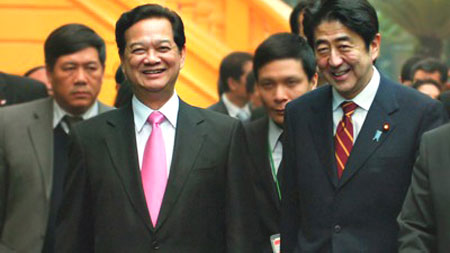 |
| Vietnam is PM Shinzo Abe’s first stopover during his Southeast Asian tour after he took office in December 2012. (Photo: VGP) |
Japanese Ambassador to Vietnam Hiroshi Fukuda highlighted the importance of the relationship in an interview about the ASEAN-Japan Commemorative Summit and Prime Minister Nguyen Tan Dung’s trip to Japan.
Vietnam-Japan relations in politics, economics, and culture have steadily ramified over the years since diplomatic ties were first established in 1973. When Prime Minister Nguyen Tan Dung and his Japanese counterpart Shinzo Abe agreed to upgrade bilateral relations to a strategic partnership in 2006, the venerable friendship entered a new era.
Japan recognises Vietnam as an important partner with similar perspectives on economic relations and regional issues of mutual concern. The two government leaders are eager to promote defence and security dialogues in the interests of a peaceful and stable region.
The Japanese Ambassador believes both sides profit from their lucrative economic and trade links, promising direct Japanese investment in Vietnam, and Japan’s support for Vietnam’s economic development, will not abate in the foreseeable future.
Fukuda said Vietnam’s national economy should respond and be shaped by domestic demand. He voiced his country’s willingness to assist Vietnam in training the high-quality human resources that can carry out economic restructuring and strengthen the market economy.
Fukuda described the cultural and educational exchanges between the two nations as an indispensable part of their relationship. He acknowledged PM Shinzo Abe’s five diplomatic principles on preserving and developing Asian cultural diversity in collaboration with ASEAN.
The principles will be elaborated at the upcoming ASEAN-Japan Commemorative Summit. Their two main pillars involve expanding cultural and art exchanges and supporting Japanese language education. Fukuda said these policies will deepen mutual understanding between the Vietnamese and Japanese peoples.
The Japanese diplomat recalled some of the 2013 Vietnam-Japan Friendship Year’s diverse celebrations of the two nations’ 40th anniversary of diplomatic ties.
The year was kicked off by PM Shinzo Abe’s official visit to Vietnam. PM Dung’s Japanese trip concludes the successful year-long commemoration.
Fukuda reiterated the significance of Vietnamese-Japanese cooperation at ASEAN and Mekong summits and regional and international forums—especially in a global context growing increasingly complex.
PM Dung applauds fine Vietnam-Japan relations
Relations between the nations are stronger than ever, based on firmer political trust.
Prime Minister Nguyen Tan Dung made the remark at a December 15 meeting with Vietnamese embassy staff and the Vietnamese community in Japan.
Vietnamese ambassador to Japan Doan Xuan Hung briefed Dung on the success recorded during the Vietnam-Japan Friendship Year and bilateral ties which has made great strides in the fields of investment, labour and training.
The 55,000 strong Vietnamese community has positively contributed to enhancing cross cultural exchanges and friendship between the two countries, Hung said.
In his speech PM Dung said Japan is ready to support Vietnam’s stance on development policies, sovereignty and territorial sovereignty.
Over the last 20 years, Japan has fast become Vietnam’s biggest ODA provider and is also the country’s largest foreign investor with investment capital totaling US$35 billion.
Remarkable development and progress has been made in defence, security, education, and training cooperation, Dung noted.
He asked embassy staff to make greater efforts in further strengthening political and diplomatic relations and deepening mutual understanding between the two countries’ people.
PM Dung also highlighted the need to boost economic and trade links by offering favourable conditions for businesses to seek mutual investment opportunities.
At the embassy, Dung witnessed the signing of several cooperation documents between agencies, enterprises and organizations.
PM Dung greets former Japanese PM
Vietnam greatly values former Japanese Prime Minister Hatoyama Yukio’s important contributions to consolidating Vietnam-Japan relations over the past years.
PM Nguyen Tan Dung told his former counterpart Hatoyama Yukio at a December 15 meeting as part of his Japanese trip for the ASEAN-Japan Commemorative Summit and the fifth Mekong-Japan Summit.
Dung said he is happy to see the strategic partnership between Vietnam and Japan grow and flourish particularly after both sides have agreed to further boost the strategic partnership for peace and prosperity in Asia.
PM Dung said he hopes Hatoyama Yukio will continue to make practical contributions to enhancing the ties of friendship and strategic cooperation between the two nations.
For his part, the former Japanese leader pledged his best efforts to increase bilateral cooperation in vocational and human resources training.
Kanagawa prefecture wants to build ties with Vietnam
The Governor of Kanagawa prefecture said businesses in his locality are very interested in investment and trade opportunities in Vietnam during his meeting with Prime Minister Nguyen Tan Dung in Tokyo on December 14.
Governor Yuji Kuroiwa said Kanagawa is the second largest prefecture in Japan with a population of 9.8 million and annual GDP of more than US$300 billion. The locality is also one of the leaders in clean technology and renewable energy.
In view of Vietnam’s stable socio-political situation and great economic potential, Kanagawa wants to enhance investment and trade ties with Vietnam, the governor said.
He added that he plans to visit Vietnam soon together with a business delegation.
PM Dung said as Vietnam-Japan strategic partnership is currently at its peak, the enhancement of ties between localities of the two countries as well as people-to-people exchanges will benefit both sides.
He affirmed that there is still great room for Vietnam and Japan to further their cooperation, and the dynamic and active moves of localities will help both sides fully tap the great potential.
He promised that the Vietnamese Government, ministries, sectors and localities welcome businesses from the Japanese prefecture for their upcoming visit to Vietnam, which is expected to help bilateral strategic partnership move forward.
VNA/VOV/ VGP




